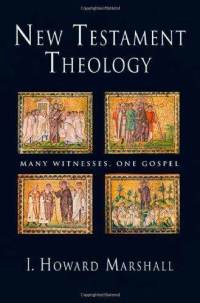 I. Howard Marshall's chapter on Ephesians in terms of Dogmas, Doctrines, Distinctives, and Details.* Dogmas. Marshall sees support for the Holy Spirit as a “personal being rather than an impersonal power” since in Ephesians 4:30 the Holy Spirit is able to be grieved by human conduct (387). He also affirms the vital role of the Holy Spirit in the life of the believer throughout Ephesians (395). Doctrines. Marshall makes reference to the Moral Example theory of Atonement as unsupported by Ephesians 5 (which supports human forgiveness as requiring divine forgiveness) since “Christian teaching on behavior was continually buttressed by central theological statements” to the point that they were made “almost causally in an ethical instruction” (387). Marshall affirms Paul's strong call for unity in the church due to believers' shared salvation experience (reconciled by the death of Jesus to form one people and one temple of God to dwell in (390)), and thus common goals while still affirming the variety within the Church (393). This leads into the affirmation that Paul’s usage of the term "ekklesia" (church) is able to encompass the Universal Church in addition to local churches (391). Marshall sees the development of the term from individual congregations to parts of a whole as “perfectly natural” (392) and therefore not a “quantum leap,” or macro evolutionary change, brought about by later Catholicizing. Christological statements are “tucked away” throughout Ephesians according to Marshall, to affirm that the “present lordship of Christ is of vital importance” (394). Verses such as Ephesians 4:9-10 are shown to fit the understanding of Christ's “V-shaped trajectory” of descending to Earth and ascending back to Heaven as taught in Paul's undisputed letters such as Philippians. Furthermore, Christ is said to fill everything, a “divine characteristic of being everywhere present is now shared with Christ” (God-Christ interchange language) (394), which explains being filled with the fullness of God. Marshall affirms Pauline authorship (379 footnote), though he sees the unwieldy prayers as potentially “characteristic of prayer in the early church” as opposed to a writing style of Paul's (390). Distinctives. Marshall takes a minority view on Ephesians 1 to maintain his Arminianism, seeing adoption in more general terms than specific predestined individuals (381 footnote). Similarly, he sees the “us” and “church” language in Ephesians 2 as situational and not eternal to undermine “limited atonement” (383 footnote). He later states persisting in sinful behavior “will lead to loss of their position and to facing the wrath of God” which sounds like the removal of salvation, though he does not support this claim with any evidence from Ephesians itself (387). Marshall defends the traditional understanding of the timeless Universal Church ranging from Heaven to Earth against the idea of a the Church as solely a “heavenly gathering centered on Christ” proposed by influential scholars such as Peter T. O'Brien (!) (392). Inconsistencies in this new interpretation (which may be a derivative of an overzealous Reformed theology and the reason for Marshall's inclusion of the material at all) are exposed, but not exhaustively. However, Marshall concludes that Paul's preservation of roles for church formation (apostles, prophets, and evangelists) and local congregations (pastors and teachers) shows that “Ephesians gives no support to the idea of a universal, world institution such as the church was later to become” (392). On this note, Marshall doesn't see the four gifts in Ephesians 4:11 as offices or positions integral to church governance, making the astute observation that the terminology of “overseers, deacons, and elders” is absent. Instead he refers to these four titles as duties or functions that church is to carry out in unity (386). Marshall clearly sees Eschatological Dualism in Ephesians (a common theme of Paul in his other undisputed letters), calling it “vertical eschatology” to refer to the current empowering of Christ from above while still having to deal with the reality of principalities and powers of spiritual darkness. Details. Marshall supports the “Lower, earthly regions” vs. “underworld” meaning of descent (394).
*Dogmas are theories directly impacting God's mission to reconcile all people to Himself (orthodoxy & orthopraxy required).
Doctrines indirectly impact God's mission (and are thus vitally important), but people can fail to interact with or understand them accurately (essential to orthodoxy, not orthopraxy). Distinctives don't affect the orthopraxy of salvation, but will impact the orthopraxy of a church. Details have little to no effect on orthodoxy or orthopraxy.
0 Comments
Leave a Reply. |
AuthorBrett Yardley: Categories
All
Archives
January 2019
|

